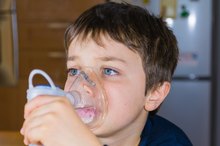When I Lay Down to Go to Sleep I Start Coughing
Coughing is one of the most common reasons for doctor's visits, according to the University of Maryland Medical Center. A doctor's visit is often necessary because there are different causes for a cough, particularly one that worsens when you are lying down. Often, a doctor will need to determine the cause before prescribing treatment.
If you are experiencing serious medical symptoms, seek emergency treatment immediately.
Causes
Often a cough that is worse when you are lying down is caused by acid reflux, or acid from the stomach backing up into your throat. Other reasons for a cough that worsens while lying down may be the post-nasal drip from a cold, or bronchitis or asthma. According to American Family Physician, coughing while lying down is sometimes the only symptom of a bronchial obstruction 1. If you have frequent bouts of bronchitis, your doctor may consider a diagnosis of asthma.
- Often a cough that is worse when you are lying down is caused by acid reflux, or acid from the stomach backing up into your throat.
- Other reasons for a cough that worsens while lying down may be the post-nasal drip from a cold, or bronchitis or asthma.
Prevention
Swimming With a Cough
Learn More
If your cough is caused by acid reflux, avoid highly acidic foods that aggravate your heartburn, particularly before bedtime. If you smoke, stop, since tobacco can also make your condition worse. You can also try using extra pillows to prop your head higher, or put a pillow or blanket under your mattress to elevate your head. Wash your hands frequently to minimize the risk of catching a cold or other viral infection.
- If your cough is caused by acid reflux, avoid highly acidic foods that aggravate your heartburn, particularly before bedtime.
- If you smoke, stop, since tobacco can also make your condition worse.
Types
Coughing may be dry or productive. If your cough is productive, it means you are bringing up phlegm as you cough. It can also be acute, meaning it does not last for more than two to three weeks at a time, or chronic, lasting more than four weeks.
Treatment
How to Stop a Gagging Cough
Learn More
Medications may be prescribed to reduce symptoms related to heartburn. Antibiotics are often prescribed to treat bronchitis, though according to American Family Physician, they have not been found effective in reducing symptoms 1. Symptoms caused by asthma may be improved with an inhaled medication.
Warning
If your cough continues for more than two weeks, consult your doctor. She will take a medical history, gather information about the type of cough and how long you have had it in order to help you determine the cause. She may also order further diagnostic tests, such as a lung function test, electrocardiogram or X-rays. Once she knows what is causing the cough, she will be better able to prescribe appropriate treatment.
- If your cough continues for more than two weeks, consult your doctor.
- She will take a medical history, gather information about the type of cough and how long you have had it in order to help you determine the cause.
Related Articles
References
- French CT, Irwin RS. Cough. Am J Respir Crit Care Med. 2016;194(8):P15-P16. doi:10.1164/rccm.1948P15
- Gibson P, Wang G, Mcgarvey L, et al. Treatment of unexplained chronic cough: CHEST guideline and expert panel report. Chest. 2016;149(1):27-44. doi:10.1378/chest.15-1496
- Irwin RS, French CL, Chang AB, Altman KW. Classification of cough as a symptom in adults and management algorithms: CHEST guideline and expert panel report. Chest. 2018;153(1):196-209. doi:10.1016/j.chest.2017.10.016
- Harvard Health Publishing, Harvard Women's Health Watch. By the way, doctor: what causes acid reflux in the throat? Updated August 2, 2019.
- Yıldız T, Dülger S. Non-astmatic eosinophilic bronchitis. Turk Thorac J. 2018;19(1):41-45. doi:10.5152/TurkThoracJ.2017.17017
- Michaudet C, Malaty J. Chronic cough: Evaluation and management. Am Fam Physician. 2017;96(9):575-580.
- French CT, Irwin RS. Cough. Am J Respir Crit Care Med. 2016;194(8):P15-P16. doi:10.1164/rccm.1948P15
- Field SK, Escalante P, Fisher DA, Ireland B, Irwin RS. Cough due to TB and other chronic infections: CHEST guideline and expert panel report. Chest. 2018;153(2):467-497. doi:10.1016/j.chest.2017.11.018
- Ng LP, Goh PS. Incidence of discontinuation of angiotensin-converting enzyme inhibitors due to cough, in a primary healthcare centre in Singapore. Singapore Med J. 2014;55(3):146-9. doi:10.11622/smedj.2014034
- Harle A, Molassiotis A, Buffin O, et al. A cross sectional study to determine the prevalence of cough and its impact in patients with lung cancer: a patient unmet need. BMC Cancer. 2020;20(1):9. doi:10.1186/s12885-019-6451-1
- American Heart Association. Warning signs of heart failure. Updated May 31, 2017.
- Gildea TR, Dacosta byfield S, Hogarth DK, Wilson DS, Quinn CC. A retrospective analysis of delays in the diagnosis of lung cancer and associated costs. Clinicoecon Outcomes Res. 2017;9:261-269. doi:10.2147/CEOR.S132259
- Del ciello A, Franchi P, Contegiacomo A, Cicchetti G, Bonomo L, Larici AR. Missed lung cancer: when, where, and why? Diagn Interv Radiol. 2017;23(2):118-126. doi:10.5152/dir.2016.16187
- American Cancer Society. Lung cancer risks for non-smokers. October 31, 2019.
- Turner RD, Bothamley GH. Chronic cough and a normal chest X-ray - a simple systematic approach to exclude common causes before referral to secondary care: a retrospective cohort study. NPJ Prim Care Respir Med. 2016;26:15081. doi:10.1038/npjpcrm.2015.81
- Dąbrowska M, Grabczak EM, Arcimowicz M, et al. Causes of chronic cough in non-smoking patients. Adv Exp Med Biol. 2015;873:25-33. doi:10.1007/5584_2015_153
- Damaraju D, Steiner T, Wade J, Gin K, Fitzgerald JM. Clinical problem-solving. A surprising cause of chronic cough. N Engl J Med. 2015;373(6):561-6. doi:10.1056/NEJMcps1303787
- Kasper DL, Fauci AS, Hauser SL. Harrison's Principles of Internal Medicine. New York: Mc Graw Hill Education, 2015. Print.
Writer Bio
Lisa Weber is a freelance writer/editor and former special education teacher. She has a bachelor's degree in journalism and professional writing, and a master's degree in special education. Over the last 15 years, she has written for a variety of newspapers, magazines, and on-line publications.









